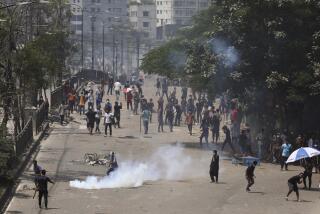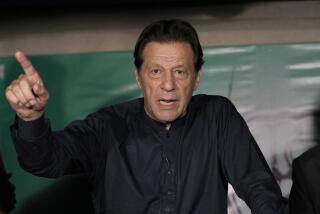Pakistan’s high court reverses ban on Sharif holding office
- Share via
ISLAMABAD, PAKISTAN — A car bomb that apparently targeted police buildings exploded today in the eastern city of Lahore, destroying several structures and causing heavy casualties, according to witnesses and local officials.
Initial reports said at least 15 people, and perhaps dozens, were killed. Officials said more than 100 were injured in the blast, which reduced at least two buildings to rubble.
There was no immediate claim of responsibility, but the bombing came as government forces were fighting to dislodge Islamic militants from the Swat Valley near the capital, Islamabad. The offensive began after Taliban fighters reneged on an agreement that allowed militants to impose Islamic law in the region if they agreed to lay down their arms.
By some counts, more than 2 million people have been displaced by the fighting.
As the fighting continues, fears have grown that the militants will retaliate by launching attacks in Pakistan’s cities.
A man who has a shop near the area of the blast, Khalilur Rehman, told Pakistani television that moments before the explosion, he saw a vehicle pull up. A man got out and began firing at a structure. Two minutes later, the vehicle exploded.
Khushro Pervaiz, a Lahore city official, said the blast razed two buildings and severely damaged several others nearby. Soldiers were deployed to the area, and emergency crews pulled injured people from the rubble of damaged buildings.
Pakistani media reports said that a nearby building of the military’s powerful Inter-Services Intelligence agency was also damaged. Pervaiz said that although the exact number of dead and injured was unknown, he had seen “a large number of casualties at the scene.”
Attackers this year stormed a police academy on the outskirts of Lahore, killed recruits and held off security forces for hours. Gunmen also attacked Sri Lanka’s visiting cricket team in the center of Lahore, killing police officers and wounding several of the players.
On Tuesday, Pakistan’s Supreme Court reversed a ruling that barred opposition leader Nawaz Sharif from holding elected office, clearing the way for one of the nation’s most popular politicians to reassert himself in its turbulent political scene.
A decision in Sharif’s favor was anticipated after demonstrations led by his party in March paved the way for the restoration of Iftikhar Mohammed Chaudhry as the high court’s chief justice. Chaudhry was removed from the post in 2007 by then-President Pervez Musharraf, the general who had ousted Sharif in a 1999 military coup. In February, a court appointed by Musharraf barred the former prime minister from holding office, citing a criminal conviction stemming from Sharif’s resistance to the coup.
Musharraf, facing impeachment, resigned last August.
“I would like to salute the people of Pakistan again because they, with great effort and struggle, fought for the independence of the judiciary,” Sharif said.
The effects of Tuesday’s decision remained unclear. Parliamentary elections are scheduled for 2013, and though Sharif could forge an effort to call for early elections, he has never expressed a desire to do so. However, until Tuesday, the 59-year-old politician had no path toward a comeback because of the ban. Now he does.
Moreover, the decision comes at a time when Sharif’s chief rival, President Asif Ali Zardari, has seen his popularity plummet.
The widower of slain former Prime Minister Benazir Bhutto, Zardari angered many Pakistanis by supporting the February high court ruling that barred Sharif from elected office.
Sharif served as prime minister twice in the 1990s. He angered the U.S. in 1998 when he approved Pakistan’s first nuclear weapons test.
Sharif’s return to politics would give Pakistanis, as well as the United States, an alternative to Zardari.
The inclusion of several Islamist groups in his party has worried some in Washington, though others believe those connections could prove to be useful as Pakistan continues its fight against the Taliban insurgency.
--
More to Read
Sign up for Essential California
The most important California stories and recommendations in your inbox every morning.
You may occasionally receive promotional content from the Los Angeles Times.













